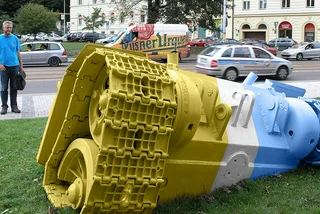The war in Ukraine will have a big impact on the tourism industry in Prague as well as spa towns in the Czech Republic. The sector was just beginning to recover from the Covid pandemic, which reduced tourism to just tens of percent of what it had been before the pandemic started. Last year, tourism in the Czech capital reached only 30 percent of what it had been in 2019.
This year, the municipal company Prague City Tourism and airport operator Prague Airport estimated in early February that tourism would reach 50 percent of 2019’s level when 8 million tourists arrived in the capital. However, due to the war in Ukraine and the still escalating tensions, the tourism sector will again be significantly damaged this year.
The loss of tourists won’t only be from Russia. Uncertainty over the war in Ukraine and the humanitarian crisis for refugees across Europe is likely to make people opt against planning a long European vacation this year.
Prague City Tourism said it cannot count on tourists coming from Asian countries and the United States, which are both strong sources of visitors who spend a long time in the city. In 2019, the U.S. was the second-largest source of tourists, while China and South Korea were seventh and eighth respectively.
Instead of advertising in those countries, Prague City Tourism this year will turn its attention to the domestic and European market.
“Given the current situation, it is clear that tourists from Russia will not come to Prague. We are currently preparing two marketing campaigns for the summer, one of which will focus on domestic inbound tourism and the other on foreign, mostly European markets,” František Cipro, chairman of the board of Prague City Tourism, said.
Prague City Tourism plans to focus its advertising efforts mainly on people ages 30 and older in its campaigns and will not target the Russian market at all. Currently, there are no flights from Russia to the Czech Republic and no time frame for when they will resume.
According to figures from the Czech Statistical Office (ČSÚ), almost 400,000 Russian tourists came to Prague in 2019, putting it fourth among countries sending tourists to the city. In 2020, it was fewer than 95,000 Russian visitors, and in 2021 the number dropped to fewer than 14,000.
In terms of overnight stays, in 2019 people from Russia in total stayed for 1.4 million nights. On average, guests from Russia stayed the longest of any nationality, at 3.5 nights each in average. In 2020 the total number of nights spent by Russians fell to a total of 337,577, and in 2021 to just 36,903.
In the meantime, Prague City Tourism has decided to become actively involved in the refugee crisis and is sending its employees and temporary workers to assist in the Refugee Assistance Center at the Prague Congress Center.
“Our company wants to get involved in real help, so we may be ready to close some of our facilities so that our employees can help with coordination in the Congress Center. Some of our guides, who speak Russian and Ukrainian and will act as interpreters, will also be involved in the assistance,” Cipro said.

Some Czech spas also rely heavily on tourists from Russia. Karlovy Vary in particular in normal times sees large numbers of people from Russia. The spas were also already hard-hit by the Covid pandemic.
Eduard Bláha, director of the Lázně Jáchymov spa and president of the Association of Medical Spas of the Czech Republic (SLL ČR), told the Czech News Agency (ČTK) said that while the spas in Františkovy Lázně or Jáchymov mostly have clients from the Czech Republic or Germany, the spas in Karlovy Vary have relied heavily on guests from Russian-speaking countries.
“Guests from Russia and probably from other post-Soviet countries will not return. And it will be a big problem for the region,” Bláha said.
War is always unfavorable for tourism, he added. Spas also face other problems such as rising energy prices. “Countries are closing and people will be afraid to travel again. In addition, they will have other worries,” he said.
Petr Kulhánek, the governor of the Karlovy Vary region and former mayor of the city of Karlovy Vary, said Covid restrictions had already hit spas hard. Some spa facilities might not be able to resume their activities, and many establishments have a shortage of staff, Kulhánek told ČTK.
Spa clientele in Karlovy Vary already started to shift during the pandemic toward more Czech guests, and spas have had to adapt to suit Czech clients.
“What is certain, however, is that we won't see spa guests from the Russian Federation here for a very long time, and focusing on any other markets is the only current solution,” Kulhánek said.

The spas in Mariánské Lázně, which is close to the German border, will continue to focus on the same markets that they relied on during the pandemic: the domestic and German markets. It also intends to focus on other European countries and Israel.
Mariánské Lázně’s Russian clients are mostly Russians who live in Germany. “We rather count them as German clients. They are mostly people who do not want to live in Russia and are usually pro-Western-minded,” Karel Kalivoda, the CEO of spa operator Léčebné lázně Mariánské Lázně, told ČTK.
The spas in Mariánské Lázně are offering some of their free capacity, especially in lower category hotels, to accommodate refugees from Ukraine and the first ones have already arrived. The spa plans to coordinate the accommodation with the Czech Interior Ministry and the Karlovy Vary region.












 Reading time: 4 minutes
Reading time: 4 minutes 




























